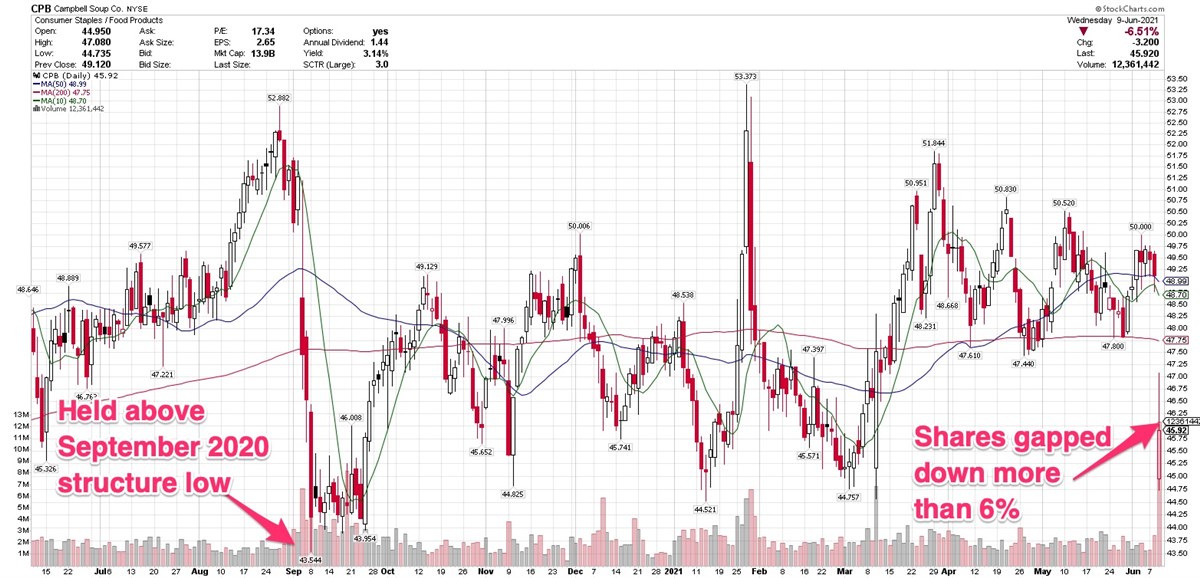Here’s a sign that some pandemic-era habits may be fading away: Shares of
Campbell’s Soup NYSE: CPB were in the soup after a disappointing third-quarter report.
The stock gapped down $3.22 or 6.56% Wednesday. Earnings per share were $0.57, down 31% from a year ago. Revenue was $1.984 billion, a decrease of 11%.
Both the top-and bottom-line numbers missed analysts’ views. Organic sales, the trade name for sales derived through existing channels, rather than through other sources, such as acquisition, skidded 12%.
To be fair, the year-over-year comparisons were extremely tough, as consumers in the year-ago quarter were stocking up on pantry goods to prepare more meals at home.
In addition, Campbell’s, like many other producers in a multitude of industries, is facing higher costs for inputs as commodity and freight costs rise.
The company slashed full-year earnings and sales guidance, but addressed measures it’s taking to stabilize the business.
Continued Momentum From Snacks
Not all the news was bad. In the earnings call, CEO Mark Clouse said, “Our sales results benefited from the continued momentum of our Snacks power brands and our U.S. retail products in our Meals & Beverage division, as well as the early signs of recovery from our food service business.”
He added that three-quarters of the company’s brands gained or held market share in the quarter, with most brands in core categories growing at higher rates than pre-pandemic levels.
Campbell’s is an interesting case study, as it was one of the very few stocks that didn’t decline sharply in March 2020. In fact, the stock notched a gain of 2.30% that month and rallied to its best levels since June 2017.
Campbell’s journey through 2020 and into 2021 also differed from most stocks. Rather than a fast upward trajectory, it traded flat or down for months. The stock rose only 1.34% over the past year. Year-to-date, shares are up 3.12%.
Among headwinds in the quarter was higher inflation related to increased transportation costs, some related to the strain caused by winter storms in Texas which resulted in the company’s Paris, Texas plant being closed for two weeks.
Clouse also cited higher costs for labor and other items that were, in some cases, higher than anticipated.
He notes that some of these challenges should be transitory.
“These transitional costs reflect about half of our gross margin erosion in the quarter and while we expect the impact of these costs to moderate into the fourth quarter, they will continue to add pressure as we fully cycle the Covid-19 environment,” he said.
He also mentioned various pressures on the snacks business in the quarter, although some brands, such as Late July Snacks, Kettle Brand potato chips, Snack Factory Pretzel Crisps, and Lance sandwich crackers, delivered their fifth quarter in a row of share growth.
The company also cited growth in its Pepperidge Farm line of products.
Campbell’s Underperforming Its Industry
The packaged food industry as a whole performed better than Campbell’s in the past 15 months since the pandemic began. One of the best stocks from the group, in terms of price performance, is SunOpta NASDAQ: STKL, a Canadian mid-cap that specializes in plant-based foods. That success could well be a reflection of the times, as plant-based and organic products are in heavier demand.
A more mainstream comparison to Campbell’s is probably packaged food giant Kraft Heinz NASDAQ: KHC, whose gapped down 1.69% Tuesday following the Campbell’s earnings report. Although Campbell’s is much smaller than Kraft Heinz, presumably the two companies face similar headwinds relating to the current environment.
Campbell’s shares dropped as low as $44.74 intraday, but finished at $45.90. Even with that session low, the stock remained within the price range of its current consolidation, holding above a September 8 low of $44.45.
The stock has been finding support between $44 and $45 since last August. Investors will learn soon if a continued selloff breaks beneath that level, or if value funds take the opportunity to add shares.

Looking to profit from the electric vehicle mega-trend? Enter your email address and we'll send you our list of which EV stocks show the most long-term potential.
Get This Free Report